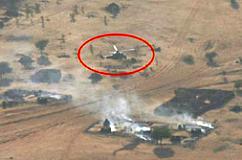Government forces, rebels clash in Darfur
By Amil Khan
KHARTOUM, July 26 (Reuters) – Sudanese government troops and rebels attacked each other in Darfur in fresh violence but one analyst said on Tuesday the international community is willing to give a new unity government time to solve the problem.

|
|
A Sudanese Army helicopter that had been strafing the village of Labado in Sudan’s Darfur region (Brian Steidle). |
The African Union said rebels killed three government soldiers in an attack on a convoy in Darfur, where United Nations officials have said killing has decreased since January.
“The SLM (Sudan Liberation Movement) attacked a government convoy on Saturday. … That is confirmed. … Three (government) military personnel were killed in the attack,” said an AU official who did not want to be named.
A Sudanese official previously told Reuters the government responded to the attack on its convoy on Saturday with an assault the next day on nearby rebel camps.
Rebels reported the government used helicopters in an attack along the main road between al-Fasher and Nyala, hitting villages and killing seven civilians.
Government bombardment using planes or helicopters was last reported in January.
The government and rebel reports have not been independently verified. A senior AU official in al-Fasher said investigators were still at the site and were expected to issue their report in one or two days.
The violence comes after John Garang, the leader of the former southern rebel Sudan People’s Liberation Movement (SPLM), entered a new government on July 9 as first vice president.
Sudan’s new government was greeted with broad international support but also warnings from the United States and others that improved relations depended upon an end to Darfur hostilities.
U.S. Secretary of State Condoleezza Rice was in Sudan last week and told officials she wanted to see “actions not words” to quell violence in Darfur.
David Mozersky, senior Sudan analyst with the International Crisis Group, said the latest attacks would probably not dent support for Sudan’s new coalition unity government.
“People are hopeful that with the SPLM entering the new government, a solution to Darfur will be forthcoming,” he said.
Garang has said he will work to end the conflict.
“If the fighting in Darfur continues, the SPLM could find itself between a rock and hard place,” said an analyst who did not want to be named.
“Right now it is way too early to say the new government is not effective … The full unity government has not yet been formed,” the analyst said.
Another analyst said the fighting, which came after a lull in recent months, showed there was a lack of commitment from the government and Darfur’s two main rebel groups towards peace talks being held in the Nigerian capital Abuja.
“The world wants to see Darfur resolved … but people are corralled into attending Abuja when the commitment from both sides just isn’t there,” said Andrew Marshall, deputy director of the Centre for Humanitarian Dialogue based in Geneva.
The government and the two main Darfur rebel groups signed a declaration of principles in the Nigerian capital Abuja earlier this month.
The agreement deals with broad-based principles for talks, but leaves the main issues to be discussed in more detail on Aug. 24, when African Union-sponsored negotiations resume.
Tens of thousands have been killed and some 2 million driven from their homes since rebels launched a rebellion in early 2003, accusing the government of neglect and arming militias to burn and loot villages. The government denies the claim.
